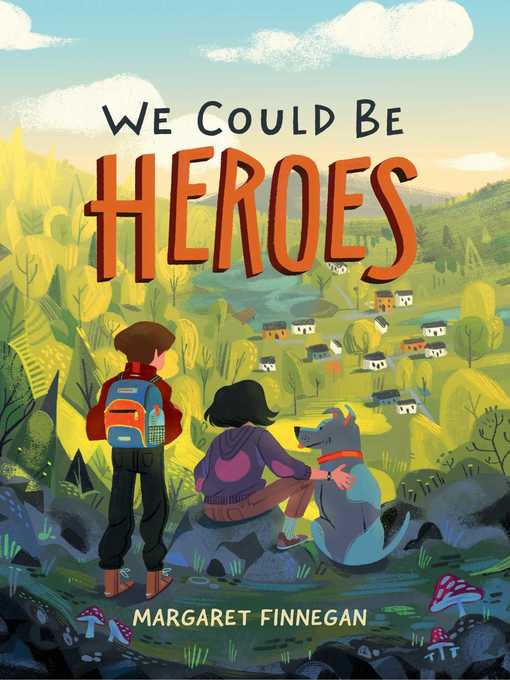
We Could Be Heroes
فرمت کتاب
ebook
تاریخ انتشار
2020
Lexile Score
720
Reading Level
3
ATOS
4.7
Interest Level
4-8(MG)
نویسنده
Margaret Finneganشابک
9781534445277
کتاب های مرتبط
- اطلاعات
- نقد و بررسی
- دیدگاه کاربران
نقد و بررسی

December 2, 2019
Autistic Hank Hudson lives in his own world; he’s happy to go unnoticed by the classmates he can’t keep straight and feels protected by a trio of rocks he chooses and carries each day. After a rare rebellious incident, Hank attracts the attention of classmate Maisie Huang, who invites him to see her geologist parents’ rock collection. The authoritative Maisie has an ulterior motive, however: guilting Hank into rescuing her elderly neighbor’s dog, Booler, a pit bull who experiences seizures. Booler lives outside, tied to a tree because of his condition, and due to Hank’s earlier audacity, Maisie believes that Hank has “the meatballs to save him.” Sensitive Hank, who is excited to have a friend but horrified by Maisie’s emotional manipulation, refuses and has a meltdown; author Finnegan uses an illustrative geological metaphor (a’a—a “lava flow where the lava moved and cooled at different rates”) for Hank’s meltdowns. Maisie is determined to “save” Booler and recruits Hank in other rescue schemes that both get him in trouble and offer him ample social experience (and provide comedic moments, as when the exceptionally honest Hank tries to lie). Debut author Finnegan, parent to a child with autism and epilepsy, deftly captures Hank’s difficulties in dealing with emotions—his own and others’—in this good-natured tale of two unlikely friends determined to save a life. Ages 8–12.

December 1, 2019
Two classmates set off to save the dog next door. Hank Hudson has his strategies for keeping the a'a at bay. A'a, a Hawaiian word he happened upon that describes a type of lava flow, perfectly captures the "worst feeling ever" and "the thing he didn't like about having autism." The giant Holocaust tome that his class is reading aloud is just so sad, so terribly sad, that it ignites in Hank the urge to take a bold action. The scheme (which involves literal ignition) doesn't quite go as planned, but it does catch the attention of his classmate Maisie Huang. Maisie is adamant about freeing Booler, a pit bull with "a lolling, happy tongue," from a life tethered to a tree. Hesitant but empathetic, Hank embarks on a series of misfires and misadventures with Maisie to permanently untether Booler, including a made-up school project to get close to Frank Jorgensen, Booler's human companion and Maisie's elderly neighbor. With each attempt, the pair realizes not all is what it seems and matters are much more complicated than they thought. Debut author Finnegan explores the many facets of the characters' situations and mindsets, including those of the secondary cast of older, mostly presumed white characters. In addition to Hank's autism, Maisie, who is Asian, takes medicine for a condition disclosed later on in the book, and an aging body affects Frank. At times, the tension simmers, but readers will be invested in the resolution of the Booler story and the community's human residents' growing understanding of themselves and one another. A coming-of-age story of friendships young, old, and canine. (Fiction. 8-12)
COPYRIGHT(2019) Kirkus Reviews, ALL RIGHTS RESERVED.

January 31, 2020
Gr 4-6-Ten-year-old Hank Hudson is used to spending time alone, preferring his extensive rock collection to the company of people. He's surprised and excited when Maisy Huang, the new girl at school, invites him over to her house, only to become demonstratively distraught when she tries to convince him to steal Booler, her neighbor's epileptic dog. Hank has autism and is easily overwhelmed when his routine is disrupted. Maisy is unrelenting in pursuing Hank's friendship while convincing him that her neighbor does not deserve Booler, who is tied up outside because he has seizures. Her antics to free Booler lead the two into some unusual situations that ultimately strengthen the bonds of friendship and understanding between these very different children. Finnegan uses a third-person limited point of view, offering the reader insight into Hank's thoughts and feelings, and viewing Maisy solely from his perspective. Read through this narrative lens, Maisy initially comes across as an unsympathetic character. As Hank's understanding of her deepens, so does the reader's understanding of the complexity of her character. Things aren't always amicable between the two, and their frequent conflict occasionally feels redundant in illustrating the difficulties of their relationship. Finnegan's choice to narrate from Hank's perspective gives readers insight into the experiences of a young person with autism. VERDICT This touching, often humorous debut addresses both autism and epilepsy without making them an overwhelming theme. An excellent choice for a classroom read-aloud.-Juliet Morefield, Multnomah County Library, Portland, OR
Copyright 2020 School Library Journal, LLC Used with permission.

December 1, 2019
Grades 3-6 Hank's deep dive into trouble starts with a sad book Mrs. Vera is reading to her fourth-grade class. Hank dislikes the book so much he tries burning it in the boy's bathroom, which garners him a three-day suspension and the attention of new-girl Maisie. When she approaches him at the edge of the field where he's looking for rocks (he's obsessed with his rock collection), Hank thinks Maisie might want to be his friend?but because of his autism, it's difficult to know for sure. When Maisie invites him to her house after school, he's even less sure because all she seems interested in is getting Hank to rescue her neighbor's dog, Booler, who's always tied to a tree. Little hiccups occur on the road to true friendship, but after Maisie experiences a health scare, the two learn to trust each other. In this character-focused novel, Finnegan successfully explores bullying, physical and mental differences, empathy, trust, inter-generational friendships, and compassion for animals. A sweet story with excellent read-aloud potential.(Reprinted with permission of Booklist, copyright 2019, American Library Association.)

























دیدگاه کاربران